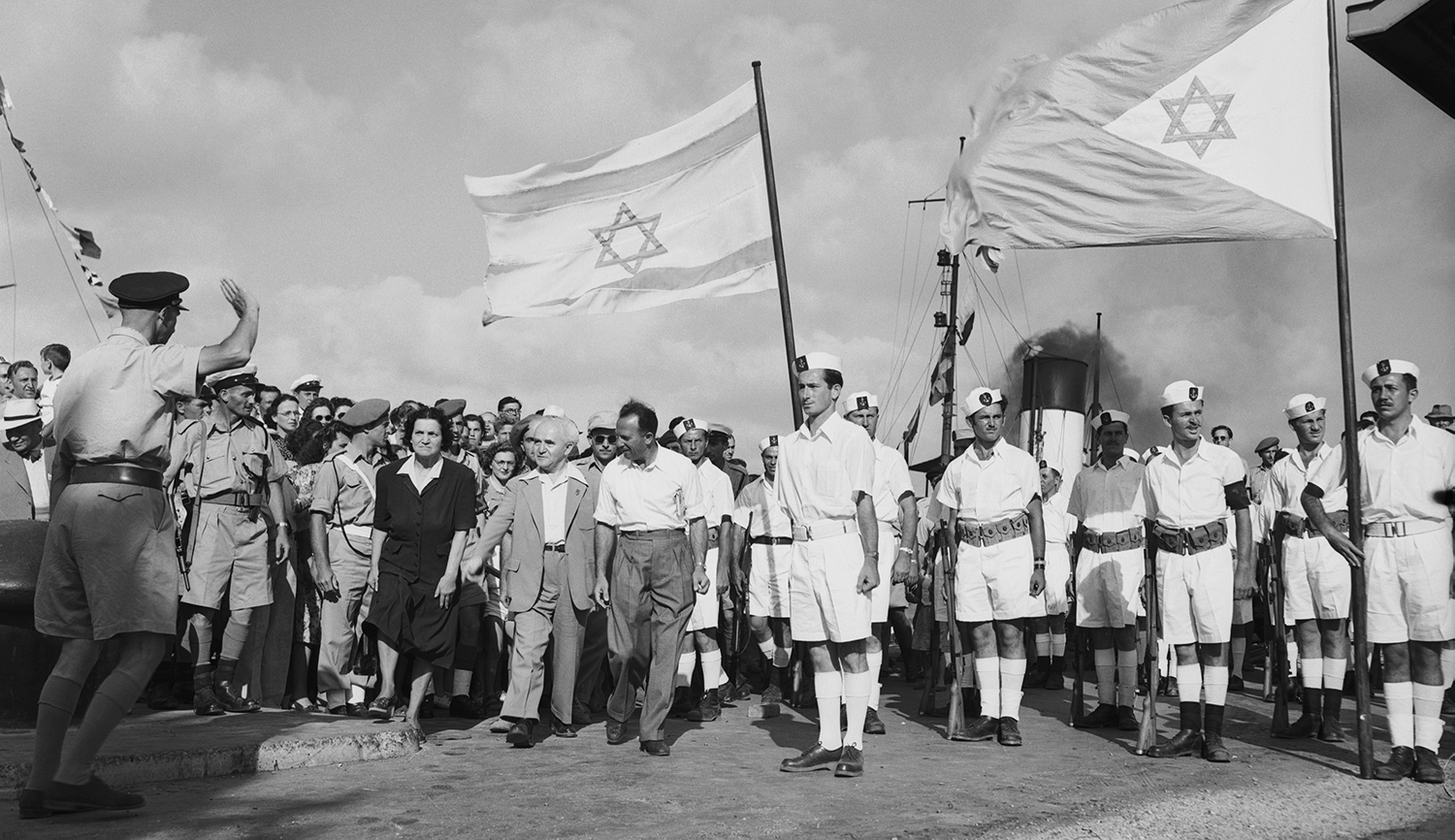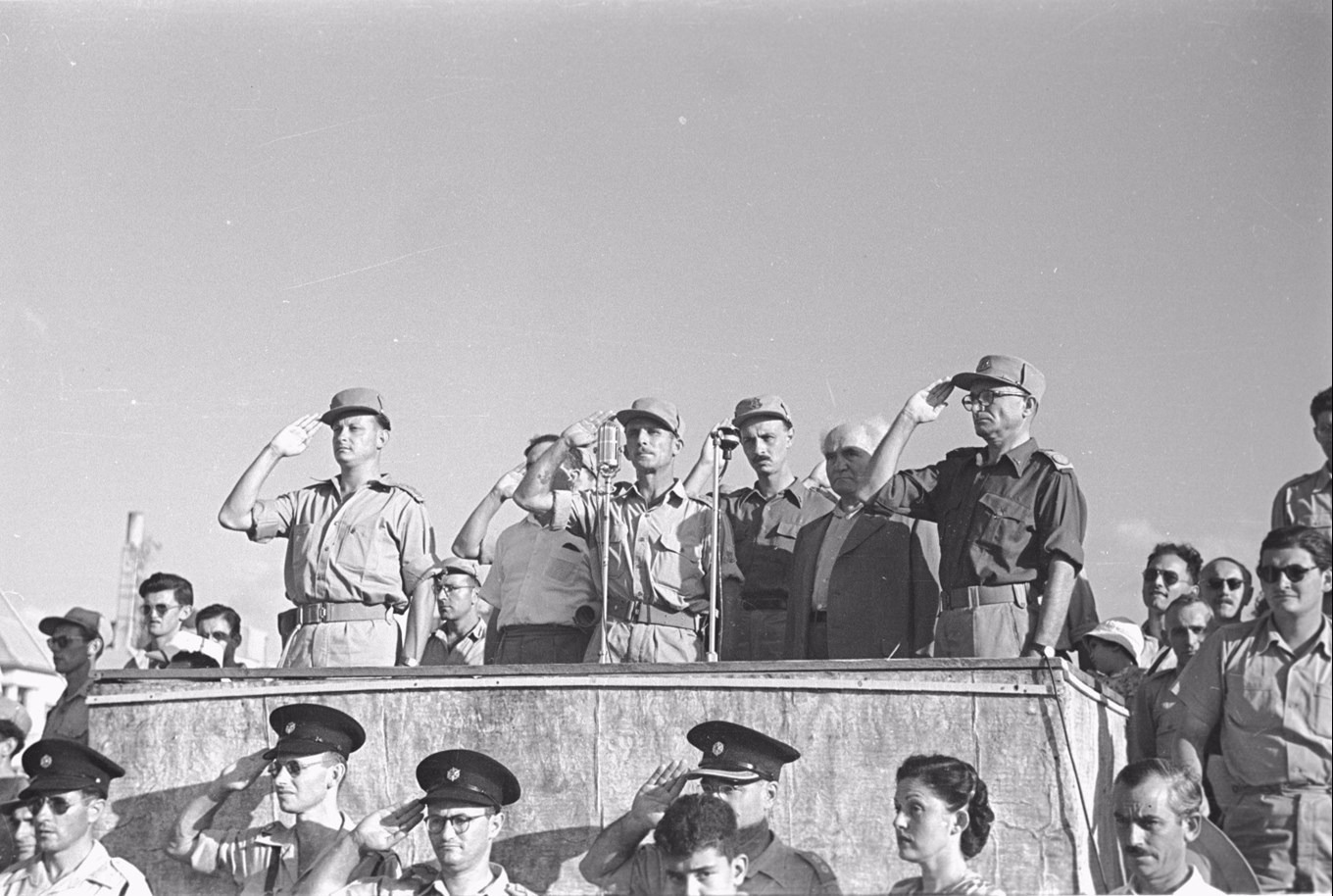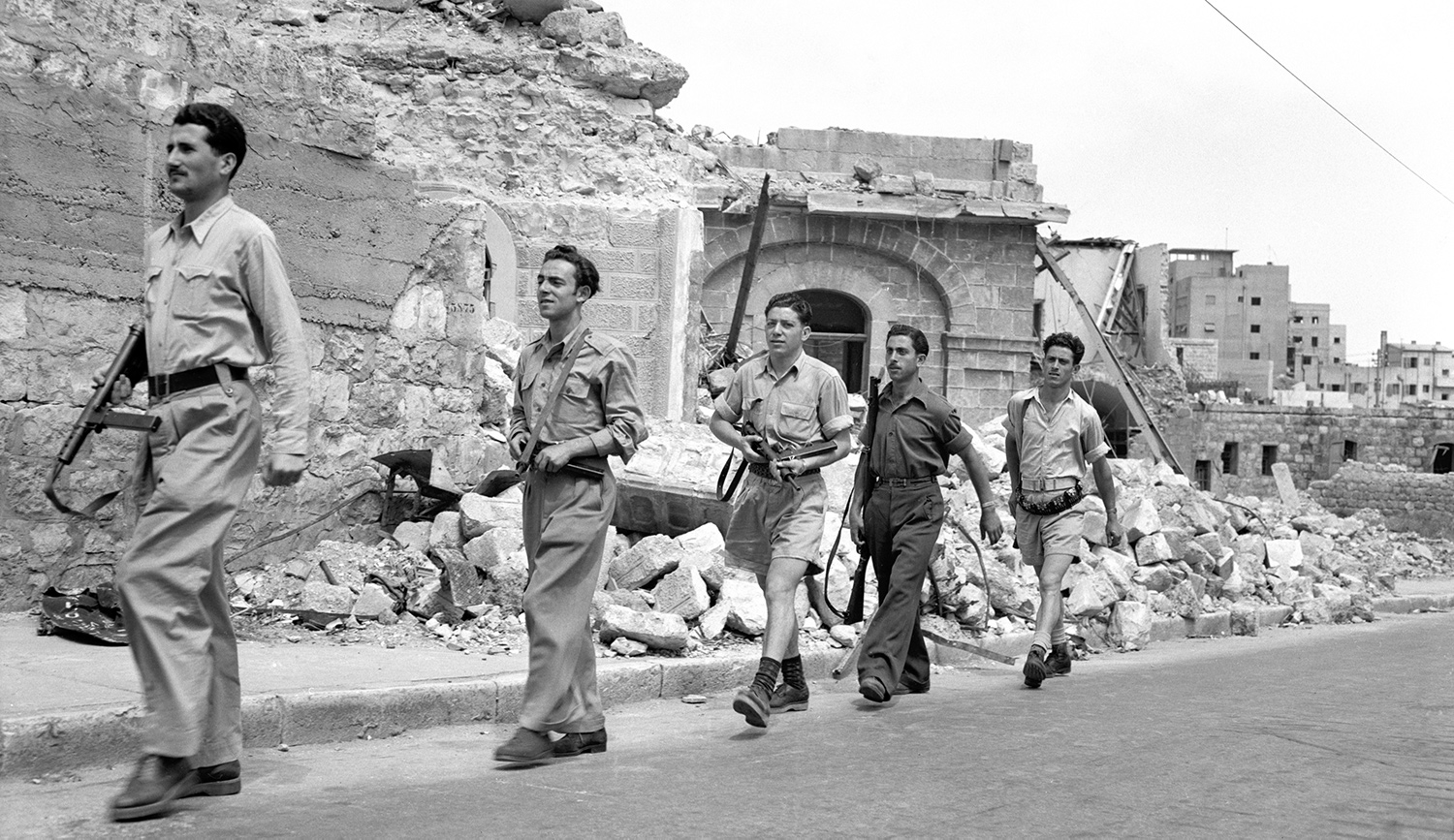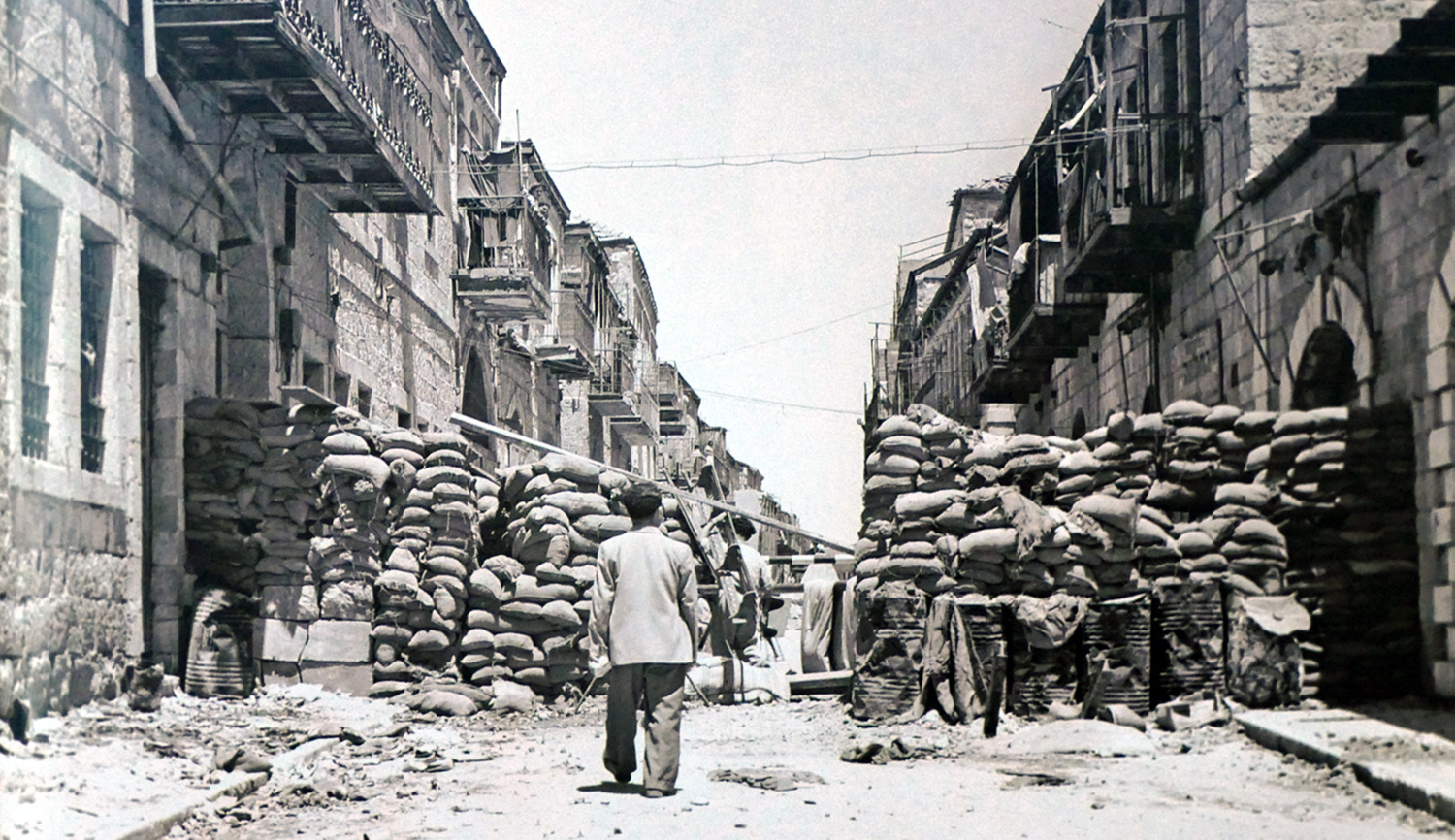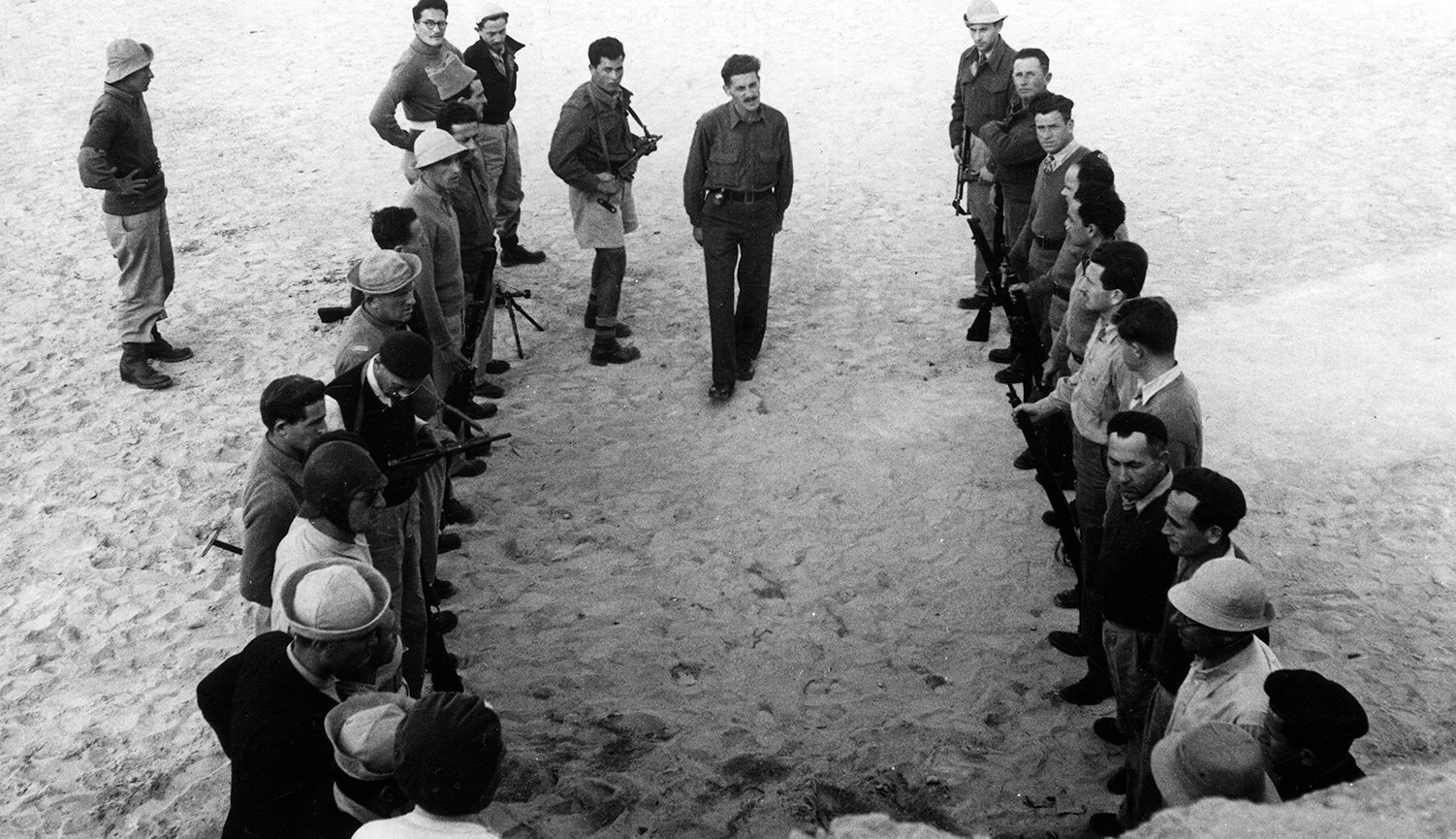I owe a debt to my three respondents, in order of their appearance: Benny Morris, Eliot A. Cohen, and Efraim Inbar. They’ve added context and some controversy to my essay, “Ben-Gurion’s Army: How the IDF Came into Being (and Almost Didn’t).” And this is a debt owed by Mosaic’s readers as well. The creation of Israel remade the Jewish people, altered the Middle East, and influenced world history. Thus, the pivotal events of 1948 invite never-ending research, questioning, and revision. Since we will never be closer to 1948 than we are now, today’s historians must leave a solid layer of interpretation for future colleagues, and my respondents have done their share.
None of them has contested my core thesis: that David Ben-Gurion used the famous May 12, 1948 meeting of the People’s Administration not only (or primarily) to secure a decision on statehood but also to consolidate and legitimate his control over the army. So there’s no reason to repeat my arguments yet again. Morris, Cohen, and Inbar have, however, raised questions about the broader role of Ben-Gurion in 1948, which is itself one of the larger topics in the history of Israel. What follows are a few reflections inspired or provoked by their contributions.
Benny Morris makes a telling comment in the preface to his response: my current essay, he writes, “is less significant” than my prior contributions on 1948. Perhaps this is because he thinks the episode itself less significant. Thus, in his sweeping book, 1948: The First Arab-Israeli War, the “generals’ rebellion” that in May 1948 roiled the yishuv, the Jewish community in Palestine, isn’t mentioned at all.
A sin of omission? Not necessarily: Morris’s book is about the Jewish-Arab war, not about the politics of the Jews who fought it. But the omission exemplifies a point I made in my piece: the other dramas of 1948—the declaration of statehood, the big battles, the flight of Arab refugees, the influx of Jewish Holocaust survivors—have rendered those internal political struggles invisible (or “less significant”) to later historians, even though they consumed the yishuv at the time. (The exception is the sinking of the Irgun arms ship Altalena, a violent denouement that has lived on in collective memory because of later Israeli politics.)
But Morris does open the door to a question I didn’t address directly in my essay: how should credit for the military successes of 1948-49 be apportioned? The rival claims have been sharply debated over the years, initially among those who fought the war in the field and later among historians who re-fought it in print. Roughly speaking, there are two schools: credit should go to the Haganah and its strike force the Palmaḥ, or credit should go to Ben-Gurion.
The canonical statement of the first school is the essay by the Palmaḥ commander Yigal Allon in Sefer Ha-Palmaḥ, an official history. Here it is not Ben-Gurion but “the leadership of the Haganah [who] envisioned the inevitable confrontation [with the Arab states] long before it had actually happened.” And in the war itself, wrote Allon, the existing Haganah units exceeded all others
in their cohesiveness, fighting spirit, and fighting skills. Luckily, all the Palmaḥ brigades and most of the field units of the IDF remained loyal to the original fighting and social principles of the Haganah and they were the ones that tilted the scales in our favor.
There is a strong whiff of this in Morris’s response.
In the most extreme version of this argument, Ben-Gurion not only contributed little to the victory, he undermined the war effort through excessive meddling in military matters beyond his competence. A rank amateur, he nonetheless bossed his generals like a “generalissimo” (the word Morris uses to describe him in 1948). In particular, his insistence that the army try again and again to take the formidable fortress at Latrun on the road to Jerusalem led to the worst disaster of the war. “Based on all military considerations,” insisted Yigael Yadin, the Haganah’s head of operations, “the action should not have been carried out, and it resulted in a terrible catastrophe.”
The contrary view is that Ben-Gurion not only made a signal contribution to military victory but gave that victory its decisive character. Linking military moves to his vision of the state’s borders and demography, he then pushed for operations that would secure that vision. Yadin, who had ferocious blow-ups with Ben-Gurion over strategy and tactics, described this as a paradox:
Usually (and it was perhaps one of his virtues) Ben-Gurion didn’t adequately appreciate the real military dangers. He didn’t exactly understand the meaning of actual fighting. . . . Even when we presented all the anticipated dangers to him, I don’t think he appreciated them. Perhaps that was our luck. If he’d appreciated the dangers, perhaps he wouldn’t have taken decisions in favor of some operations.
Many of those operations drove Israel well beyond the narrow lines of the United Nations partition plan of 1947. But Ben-Gurion didn’t only push: he also reined in overly-enthusiastic generals. During the war, Allon seized a corner of the Egyptian Sinai, taking the war outside of mandatory Palestine. Ben-Gurion, in response to U.S. pressure, bluntly ordered him to withdraw, a decision that infuriated Allon and several other commanders. Yet this is how Allon explained to them his grudging decision to obey:
What sort of Jewish state do we want to make in the land of Israel? A South American-style state in which colonels and generals, usurpers, will rule? Or a democratic state, in which elected leaders will decide our fate in war and peace? This democratic asset is more important than the Sinai.
In this case, what also went hand-in-hand with democracy was Israel’s pro-Western orientation, which required of its leader the sort of restraint not usually shown by generalissimos. Here I come down squarely on the side of Eliot Cohen, who in his response hails Ben-Gurion as “an outstanding war statesman.” (A little later I’ll come to Cohen’s comparison of him with Churchill.)
All of this having been said, Morris is right that the Haganah’s commanders as well as those of the Palmaḥ did win the war in the field. One is reminded here of the 2004 remark by then-U.S. Secretary of Defense Donald Rumsfeld: “You go to war with the army you have, not the army you might want or wish to have at a later time.”
Ben-Gurion’s struggle for control came in two stages: first, ascendancy over the army he had, followed later by building the army he wanted to have. The real transformation of the Israel Defense Forces came only after the war wound down. But there is no doubt that Ben-Gurion bent the commanders to his will during the war, which helped him to remake the army afterward.
Was such “reorganization” just a cover for Ben-Gurion’s plan to remove officers affiliated with the left-wing Mapam party from the army command, as Morris seems to suggest? I didn’t assign a relative weight to such a motive. (Neither, by the way, does Morris in 1948: “in part, it was a struggle over management of the war. . . . It was also, in part, a political squabble.”) But I deliberately indicated the Mapam affiliation of every single critic of Ben-Gurion whom I quoted.
Mapam was a highly disciplined, thoroughly ideological, and nominally pro-Soviet party. Its following constituted only about 15 percent of the yishuv (as would be shown in the first Knesset elections of 1949), less than half of the percentage held by Mapai, Ben-Gurion’s party; yet its members filled the Haganah command. Was Ben-Gurion’s distrust of them exaggerated and politically driven? Possibly. But I wouldn’t entirely dismiss the verdict of another historian, Tom Segev, hardly a Ben-Gurionist: “Ben-Gurion suspected, and not without justification, that some Palmaḥ fighters would place obedience to their [Mapam] party before obedience to General Headquarters” (emphasis added).
In any case, who can argue against the claim that in an orderly polity, only one legitimately constituted authority should monopolize armed force? As Efraim Inbar points out in his response, states that lack such control usually fail, and one need only look to Israel’s Arab neighbors for examples. Inbar invokes the sociologist Max Weber, who described “the monopoly of the legitimate use of physical force” as a fundamental attribute of the state. “Although we have no similar statement by Ben-Gurion,” Inbar adds, “it seems that, at least intuitively, he understood the challenge and responsibilities of statehood in similar terms.”
He did, and I’m also happy to report that Ben-Gurion did actually say something similar. “There is always a danger with people who have arms and constitute a force,” he told his Mapai party early in 1948, “and if that force is not subordinate to a supreme authority, they constitute a great danger to the public and to themselves.” Weber didn’t really say it any better than that.
There is a rich literature on civil-military relations in Israel, attempting to explain how Israel evaded the “great danger” despite its almost permanent state of war. The explanations are many, but they all begin at the same place: with Ben-Gurion himself.
I come now to comparisons. Eliot Cohen writes that Ben-Gurion was “as outstanding in his way, given the size of the stage on which he operated, as Churchill on his much larger stage.”
It should be noted that, among Ben-Gurion’s fervent adherents, this is a modest comparison. Shimon Peres, once a close aide to Ben-Gurion and later president of Israel, said he, too, regarded his mentor as comparable to Churchill (and Charles de Gaulle), but Peres didn’t stop there:
I also thought of Ben-Gurion as a latter-day Moses. A great shepherd to his people, he was also their prophet, fighting against all conventions and, like Moses, never fully satisfied. He led them across the desert toward the promised land.
Yitzḥak Navon, Ben-Gurion’s private secretary in the 1950s and also a later president of Israel, thought Ben-Gurion belonged in the category of Moses, Joshua, and King David. “But we are so near to his time,” he admitted, “that people will hesitate to use such high words. I do, too. But no doubt, that’s how he will be remembered in the future.”
Well, no one knows how anyone will be remembered “in the future” (a long period of time by any reckoning); nor can Ben-Gurion be guaranteed inclusion among the Jews’ mythical or legendary heroes. It will depend. But Cohen’s comparison of Ben-Gurion with Churchill is worth considering, not only because the two were near-contemporaries but also because Ben-Gurion took Churchill as his model.
The evidence of his admiration for Churchill is clearest in the letters he wrote from London to his wife Paula in 1940. They included extracts, in English, from Churchill’s greatest speeches, as well as references to the great fortune of the British people in having such a leader at so desperate a time. (He admired de Gaulle still more, but only because Churchill had the advantage of leading the resolute British, whereas de Gaulle had the chore of rallying the defeated French.)
In a letter to Paula from London written in September 1940, he passed judgment on the role being played by Churchill in that darkest hour. He began with a premise familiar to any Marxist: “I usually don’t believe that history is made by leaders, great or small; the circumstances, characteristics, tendencies, needs, habits, and experiences of the masses are decisive.” But then his thoughts took a U-turn:
Yet there are moments of crisis, hours when the scales of history waver between life and death, destruction and redemption, victory and defeat. The masses sway back and forth among possibilities, and one mistaken step, small oversight, temporary confusion, or misperception might prove decisive. In such an hour, the presence or absence of a leader who is courageous, quick-minded, far-sighted, and accomplished can make the difference between ruin and salvation.
Ben-Gurion said this of Churchill, but the same might be credibly said in favor of Ben-Gurion himself, with this difference: the Arabs, not being the Germans, didn’t have the power to threaten the Jews with death, destruction, defeat, and ruin. Both Ben-Gurion and his opponents, as well as the commanders of the Haganah and the Palmah, knew within days of the Arab invasion that the Jews would prevail.
The dismal state of the Arab forces came as a welcome surprise, and explains why, as Morris puts it, the Haganah command “accomplished exactly what Ben-Gurion had long argued they could never do.” It wasn’t only that the Haganah had “prepared well,” as Morris claims. It was that the Arab armies had hardly prepared at all.
But what sort of victory would it be? Christopher Sykes, in his still-valuable Crossroads to Israel (1965), pointed out that the chaos and disunity on the Arab side “ruled out the possibility of their victory.” But, Sykes added, “merely to win would not serve the [Jews’] need: to reach their goal they had to achieve a decisive victory. Nothing less would do.” Nothing would so cripple the new state as a “partial victory or prolonged indecisive engagements.”
Ideally, the war’s end would leave Israel with much more defensible borders than those of the UN partition plan, yet still earn the new state the recognition of the governments and opinion-makers who had supported that plan. Israel’s newly-minted generals, many of them just off the kibbutz farm and innocent of the wider world, could never have crafted such a combined military and political victory. Ben-Gurion, practically alone, did just that.
The army forged by Ben-Gurion during the war and after victory has never been above controversy or immune from error. But by every measure of Israeli public opinion, the IDF is the most trusted institution in the country today. The government, the Knesset, the Supreme Court, and the police don’t even come close to it. Substantial parts of the public believe that these and other state institutions have been captured, at least in part, by corrupt politicians, political hacks, arrogant bureaucrats, greedy lobbies, entrenched elites, “the left,” or “the settlers.” In polls, only a minuscule minority think the same of the army.
Whether Ben-Gurion’s spirit lives on in any of Israel’s other institutions is a subject worthy of debate. That it continues to guide the IDF is beyond dispute.
More about: 1948, David Ben-Gurion, IDF, Israel & Zionism
